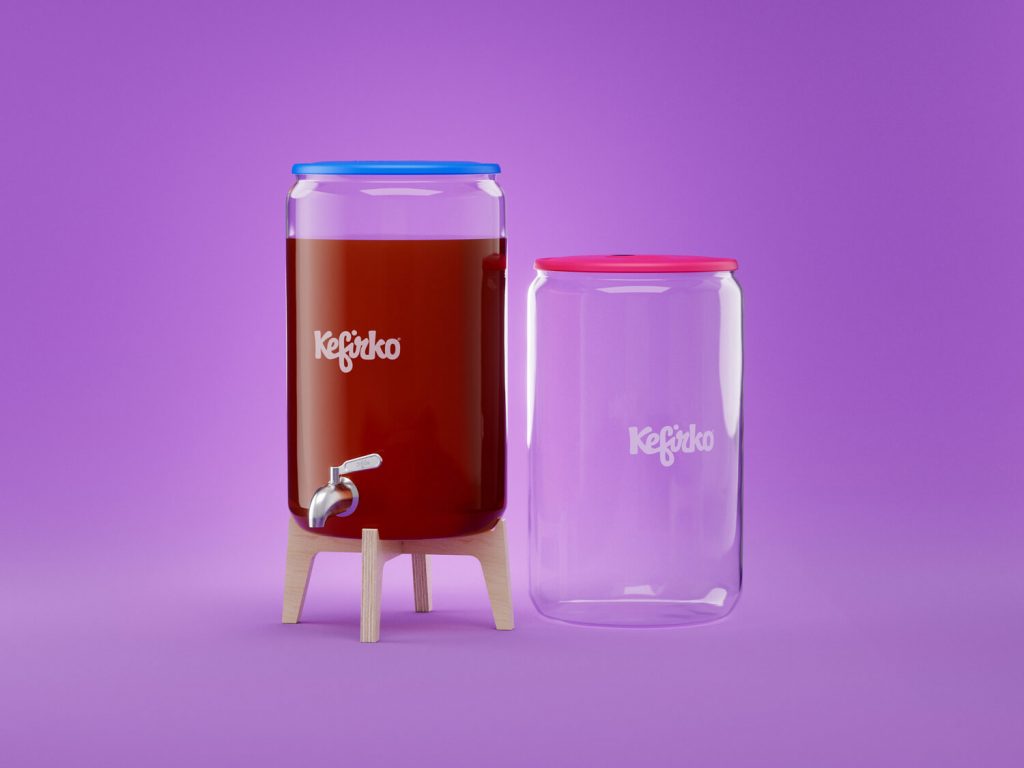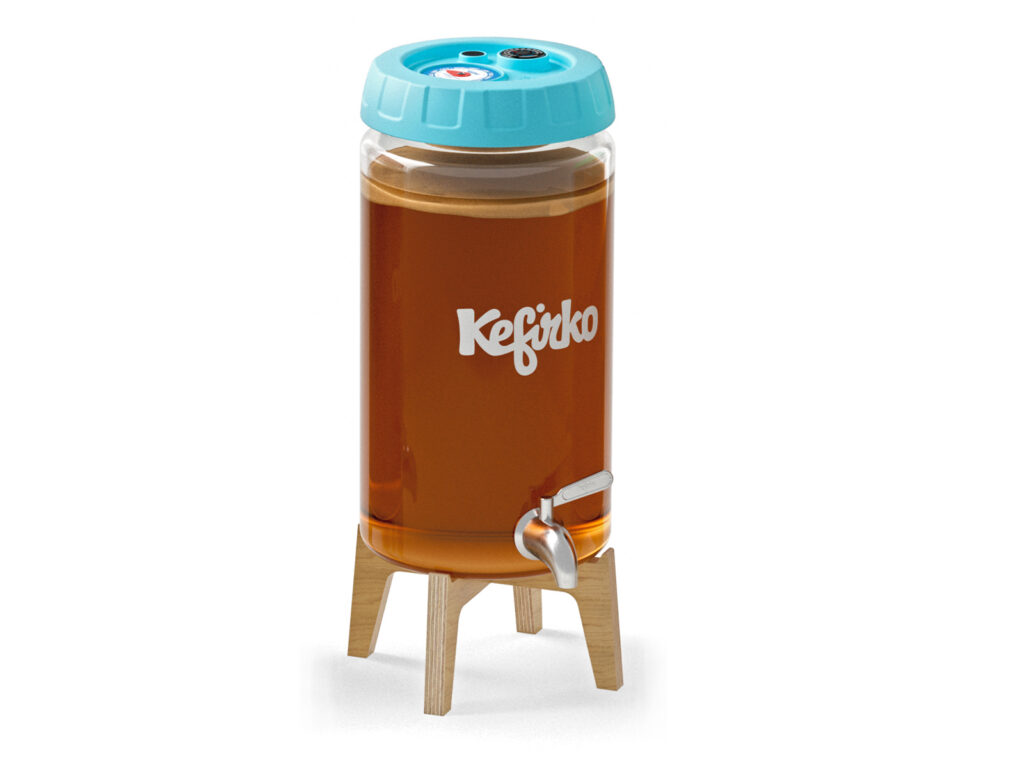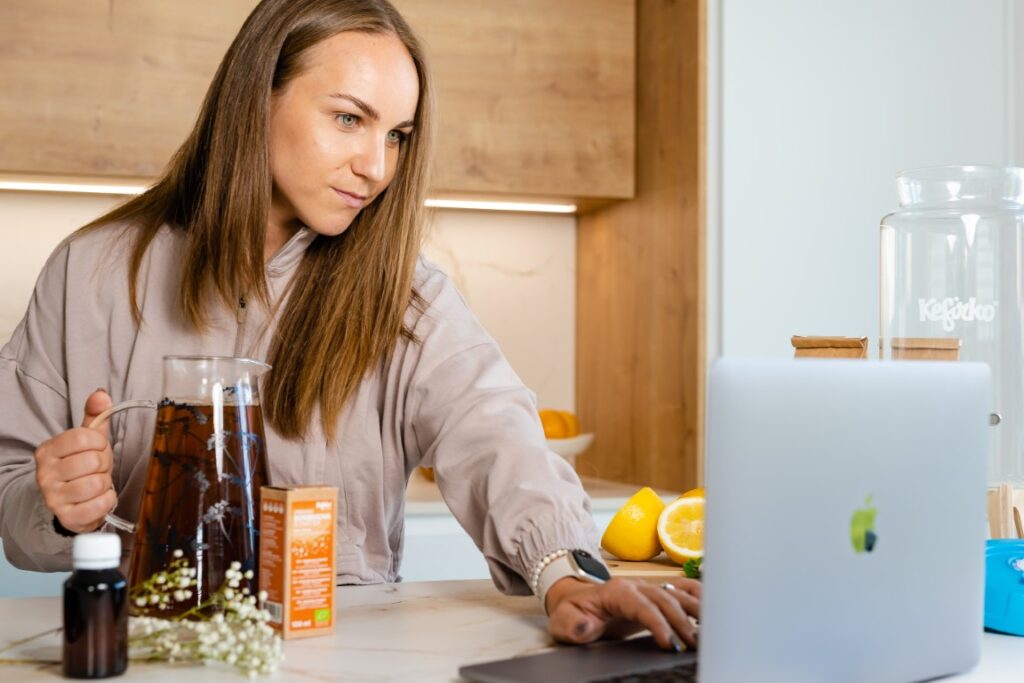
KOMBUCHA MAKING
How to make Kombucha?
For 1l of Kombucha you need:
1. Quality glass with a lid.
2. 4g/3tsp (2 tea bags) black or green tea.
3. 50g of sugar.
4. 100 ml Kombucha starter or Kombucha SCOBY with liquid.
What is Scoby?
“SCOBY” is an acronym that stands for Symbiotic Culture Of Bacteria and Yeast. This living culture forms a gelatinous, pancake-like layer at the interface where the liquid meets the air. It plays a vital role in the fermentation process of kombucha, a popular fermented tea beverage.
The SCOBY resembles the top of a mushroom, which is why it’s often nicknamed a “tea mushroom” or “kombucha mushroom.” Another common term is “kombucha mother,” highlighting its role in generating new cultures and fermenting the tea.
During the kombucha brewing process, both a SCOBY and some fermented tea (called “starter”) are typically added to a new batch of sweet tea. However, even if you only use starter liquid, a new SCOBY will naturally begin to form on the surface of the tea. This is a normal and healthy part of the fermentation process.”
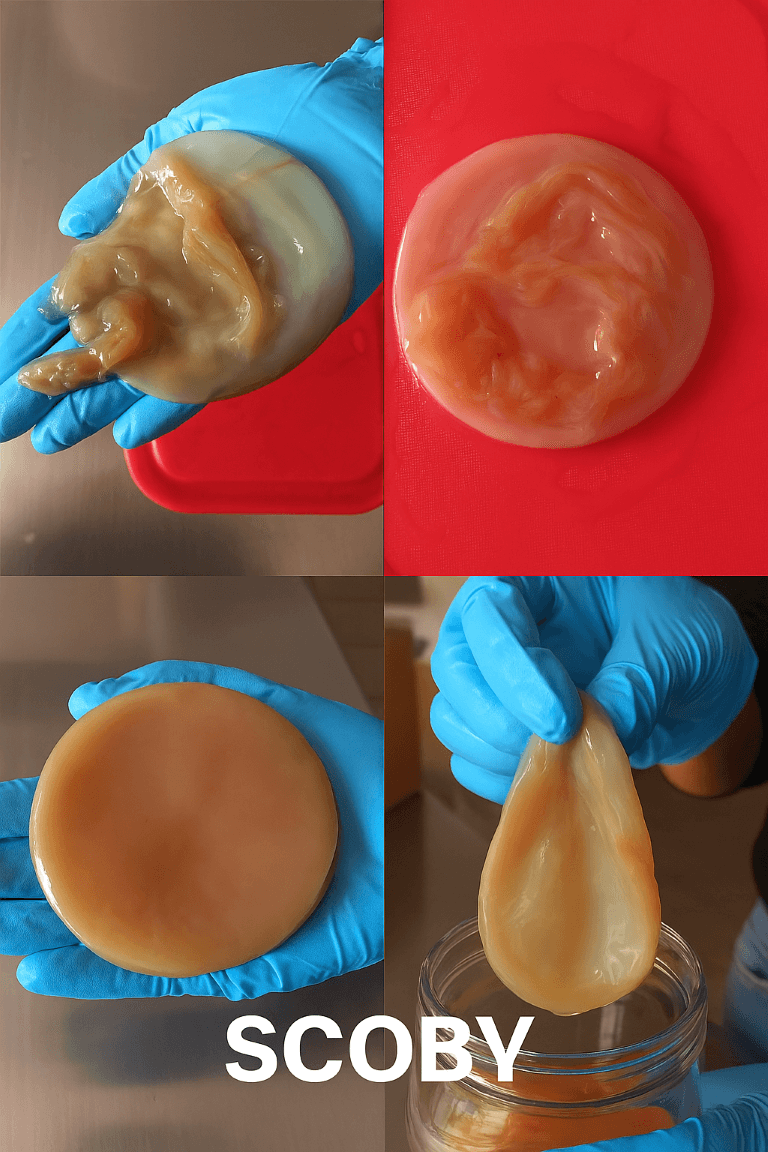
See answers to FAQs about kombucha below.
Kombucha Fermentation
How to
To make kombucha at home, you’ll need tea, sugar, a SCOBY, and / or a starter liquid (previously brewed kombucha). Brew the tea, dissolve the sugar, let it cool, then add the starter liquid and SCOBY. Ferment for 7–14 days, tasting along the way, until it reaches your desired flavor.
Basic recipe (for 1l of kombcha):
- 2 bags of tea (2 tsp tea leaves)
- 50g sugar
- 900 ml water
- 100 ml kombucha starter or SCOBY and 100 ml kombucha from previous batch
Get everything you need to brew kombucha at home right here!
Kombucha is a fermented tea made by combining tea, sugar, and a symbiotic culture of bacteria and yeast (SCOBY). The fermentation process produces beneficial probiotics, organic acids, and a slightly effervescent, tangy drink.
Recommended temperature for making kombucha is between 21 and 25 degrees (C). Lower temperatures will slow down the fermentation and higher temperatures will speed it up. Higher temperatures are also optimal for yeast development, which you can see as brown strains on the SCOBY and in kombucha as well. Too much yeast in kombucha changes the balance and affects the taste too.
Get everything you need to brew kombucha at home right here!
Kombucha typically ferments for 7–14 days, depending on the ambient temperature and your taste preference. The longer it ferments, the more sour and less sweet it becomes.
Get everything you need to brew kombucha at home right here!
Taste testing is the best way to determine when your kombucha is ready. The flavor should be slightly tangy and less sweet. If it’s too sweet, it needs more time to ferment. If it’s too sour, it’s over-fermented.
Continuous brewing of kombucha is a method where you maintain a perpetual fermentation process by keeping a portion of the finished kombucha in the jar and adding fresh tea and sugar regularly. This creates a constant supply of kombucha without the need to start a new batch from scratch each time.
Yes! After the primary fermentation, you can add flavors by infusing kombucha with fruits, herbs, or spices during a second fermentation in sealed bottles. This adds natural flavors and increases carbonation.
Once the fermentation is complete, store your kombucha in the fridge to slow down the fermentation process. This helps maintain the flavor and prevents over-fermentation.
Flavored kombucha should be stored in sealed bottles at room temperature for 1–3 days to carbonate. After carbonation, move it to the fridge to stop the fermentation process and preserve the flavor.
Other / Troubleshooting
To reduce sweetness, allow the kombucha to ferment for a longer period. The yeast and bacteria consume more sugar as fermentation progresses, making the drink less sweet and more acidic.
If you prefer a milder taste, you can shorten the fermentation time. Alternatively, you can add a small amount of sugar during secondary fermentation to balance the sourness.
If your kombucha is too vinegary, try reducing the fermentation time. Also, ensure you’re using the correct ratio of tea, sugar, and starter liquid to achieve a balanced fermentation process.
If your kombucha is too acidic, reduce the fermentation time and avoid fermenting at very high temperatures. The longer the kombucha ferments, the more acetic acid it produces, which makes it more sour.
Excessive fizz can happen if fermentation is too long, or if secondary fermentation (in sealed bottles) produces too much carbonation. On the other hand, low fizziness could be due to insufficient fermentation time, not enough sugar, or a weak SCOBY.
A slimy texture is usually a sign that the kombucha is over-fermenting or has excess yeast growth. If it’s just a bit slimy, it’s still safe to drink, but you might want to reduce the fermentation time next time.
If you notice mold on the surface of your kombucha or SCOBY, it’s best to discard the entire batch, including the moldy SCOBY, as mold can be harmful and it’s not safe to consume contaminated kombucha. Check your brewing area to ensure it’s clean, dry, and free from contaminants. Mold thrives in humid, warm conditions, so make sure the jar is covered with a proper lid, and the environment is not too hot or humid. Clean all your brewing equipment thoroughly with hot water and vinegar (avoid soap, as it can leave residue). Start a new batch with a fresh SCOBY and starter liquid.
A weak kombucha batch could be caused by using too little tea, sugar, or starter liquid, or by insufficient fermentation time. Make sure to use the correct amounts of ingredients and give it enough time to ferment.
STARTER/SCOBY
How to
“SCOBY” is an acronym that stands for Symbiotic Culture Of Bacteria and Yeast. This living culture forms a gelatinous, pancake-like layer at the interface where the liquid meets the air. It plays a vital role in the fermentation process of kombucha, a popular fermented tea beverage.
The SCOBY resembles the top of a mushroom, which is why it’s often nicknamed a “tea mushroom” or “kombucha mushroom.” Another common term is “kombucha mother,” highlighting its role in generating new cultures and fermenting the tea.
During the kombucha brewing process, both a SCOBY and some fermented tea (called “starter”) are typically added to a new batch of sweet tea. However, even if you only use starter liquid, a new SCOBY will naturally begin to form on the surface of the tea. This is a normal and healthy part of the fermentation process.”
A kombucha starter is an essential ingredient for brewing kombucha at home. You can prepare your first batch of kombucha using only kombucha starter liquid. It kickstarts the fermentation process by lowering the pH of the tea, creating an environment that prevents the growth of harmful bacteria and promotes the development of the SCOBY. Over 1–4 weeks, a jelly-like layer (the SCOBY) will start to form on the surface of the liquid.
To prepare kombucha using only a kombucha starter (meaning you don’t have a SCOBY), you’ll need to use some already brewed kombucha as the starter liquid to kickstart the fermentation process. Here’s a simple method: If you are using the starter, pour in the 0,1 l of starter into the sweetened tea (900 ml). The scoby will start to form during the first fermentation. You have to leave it to ferment a bit longer, for 10-14 days. The first batch of kombucha made this way may not form a full SCOBY right away, but it will begin to grow one over time.
Yes, you can reuse your SCOBY for multiple batches. In fact, it will grow and develop new layers with each fermentation. Just make sure to store any extra SCOBYs in some kombucha or sweet tea to keep them alive between batches.
Keep your SCOBY in a clean, well-maintained environment. Always ensure that it’s submerged in liquid to avoid drying out. When not in use, store it in a jar with some kombucha or sweet tea to keep it hydrated and healthy.
To store extra SCOBYs, place them in a jar with enough kombucha to cover them completely. Keep the jar at room temperature and change the liquid every couple of weeks to keep the SCOBYs healthy.
Other / Troubleshooting
SCOBYs can float, sink, or hover in the middle of the jar. The position of the SCOBY doesn’t affect the fermentation process as long as it’s submerged in liquid. Sometimes, new layers may float, and older layers sink.
A healthy SCOBY can sometimes have a brownish or yellowish color, which is normal due to the fermentation process. However, if it looks moldy or unusual (green, black, or fuzzy), it’s best to discard it and start fresh.
INGREDIENTS, ACCESSORIES, RECIPES
The foundation of your kombucha journey is a reliable fermenting jar. Opt for glass jars, as they are non-reactive and won’t interact with the acidic content produced during fermentation. Glass also allows you to easily monitor the process. While plastic or ceramic jars may be used, ensure they are acid-resistant. Choosing a jar with sufficient thickness is crucial for the fermentation process. Covering your fermenting jar is another important step, as the lid helps protect your brew during fermentation. Consider jars like the Kefirko jar, which provides an ideal environment for fermentation.
or brewing kombucha, the best sugar is white granulated sugar or organic cane sugar, as they are easy for the SCOBY to process and ensure consistent results. Avoid artificial sweeteners, as they don’t provide fermentable sugars, and highly mineral-rich sugars like coconut sugar, as they can harm the SCOBY. Keep it simple for the best brew!
No. Microbes in kombucha need sugar to ferment. This is serve as food for them and the result is a probiotic drink that is so beneficial for you. Note, the sugar in kombucha is for the microbes not for you. You can add sweeteners or stevia to sweeten your beverage before drinking.
Kombucha is traditionally made with black or green tea (or a combination of both). Other types of tea, such as herbal or fruit teas, can also be used, and many people have success with them. However, make sure the tea doesn’t contain artificial ingredients, as they may harm your SCOBY. In the long term, brewing with pure black and/or green tea gives the best results in taste and health benefits, producing the healthiest cultures.
Like with all fermentation, it’s important to use clean equipment. This also means thoroughly washing your hands and all the equipment that will get in touch with kombucha. Sterilisation is also recommended but it’s not necessary as long as you maintain cleanliness and hygiene.
Yes! Kombucha can be used as a starter for other fermented beverages, such as jun tea, or even in recipes for homemade vinegar.
Yes, kombucha can be used in cooking or baking as a replacement for vinegar in dressings, marinades, or sauces. Some people also incorporate it into bread recipes to add flavor and probiotics.
Yes, kombucha can be used as a mixer for cocktails! Its tangy, effervescent nature makes it a great substitute for soda or tonic water in alcoholic beverages.
Yes, you can make caffeine-free kombucha using herbal teas like rooibos, chamomile, or hibiscus. However, caffeine helps the fermentation process, so you might need to adjust the fermentation time or use a small amount of black or green tea mixed with herbal teas.
GENERAL/SPECIFIC
Kombucha is generally safe for most people, but it contains a small amount of alcohol (approximately 0.5%, produced during fermentation) and may not be suitable for everyone, especially pregnant women or those with weakened immune systems. Always consume it in moderation.
Like other fermented beverages, kombucha contains live microorganisms which means it can have some side effects, especially on the digestive system. If you haven’t got experience with live fermented foods, start with small amounts of kombucha, from 100ml/4oz per day and then slowly increase the amount. You can easily drink up to 250ml/8oz two times a day or even more. It’s a perfect replacement for other soft drinks.
Kombucha has a pH from 2.5 to 3.5 and is considered a pretty acidic beverage.
While kombucha can be a refreshing drink on an empty stomach, it contains acids and probiotics that may cause some discomfort for sensitive individuals. If you’re new to kombucha, start with small amounts and see how your body reacts.
While kombucha is generally considered safe for most people, it contains trace amounts of alcohol (approx. 0,5%), which might not be ideal during pregnancy or breastfeeding. It’s best to consult with your healthcare provider before drinking kombucha during these times.
Kombucha contains probiotics that can support gut health and digestion. However, individual results vary, and kombucha should not be relied upon as a cure for digestive issues. It’s best enjoyed as part of a balanced diet.
Kombucha is often marketed as a detoxifying beverage due to its probiotics, acids, and antioxidants. While it may support liver and gut health, it’s important to remember that no single food or drink can perform a full detox. Healthy lifestyle choices, including a balanced diet and plenty of water, are key.
Kombucha is a naturally fermented tea made from water, sugar, and a live culture of Bacteria and Yeast. This traditional drink is packed with probiotics, organic acids, antioxidants, and beneficial nutrients that contribute to a wide range of wellness benefits.
Here are the top kombucha benefits and why it continues to gain popularity:
- Rich in Probiotics – Supports gut health and balances digestion.
- Digestive Support – Organic acids and enzymes ease bloating and boost nutrient absorption.
- Immune Boost – Antioxidants and a healthy gut help strengthen your immune system.
- Natural Detox – Glucuronic acid aids liver detox and toxin removal.
- Energy Boost – Caffeine (caffeine from tea is lowered during fermentation for about 2/3), B vitamins, and iron improve energy and focus.
- Mental Wellbeing – A healthy gut supports mood, stress resilience, and brain function.
- Low in Sugar – During 7–14 days of fermentation 50–70% of sugar is consumed. Great low-sugar soda alternative.
- Vegan & Gluten-Free – It is naturally vegan and gluten- free.
- Non-Alcoholic – Kombucha is a non-alcoholic beverage by standard definition, although trace amounts of alcohol can be present due to natural fermentation. This makes it a refreshing and functional alternative to alcoholic drinks.
- Kombucha isn’t just trendy — it’s a powerhouse of health benefits in every sip.”
